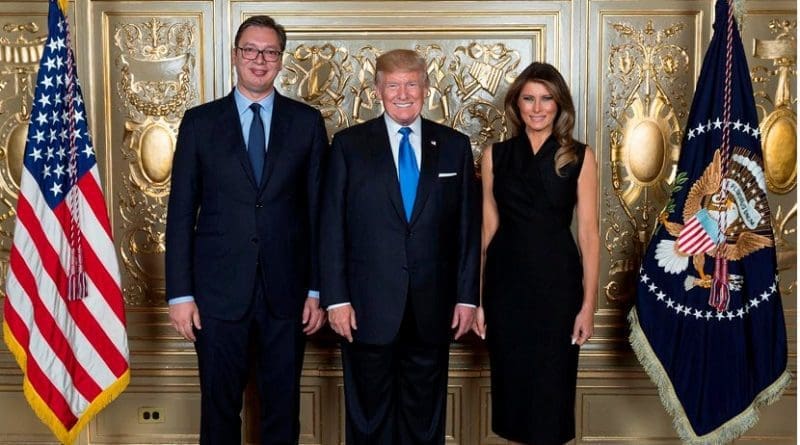Serbia: Vucic Response To Campaign Finance Investigation Raises Doubts
By Gordana Andric
After a BIRN investigation found that Serbia’s ruling party used proxy donors to pump cash into election campaigns, the president agreed that donors likely used proxies, but claimed his party was in the clear.
Serbian President Aleksandar Vucic said that he “assumes” that nearly 7,000 donors who gave the ruling Serbian Progressive Party an identical amount of 40,000 dinars (around 320 euros) during his 2017 presidential campaign, did so “because it was allowed that individuals donate that amount – and not more than that.”
He said that he did not know the process for certain, and neither did he comment on the identity of the donors – some of whom had been on social benefits at the time.
“I don’t know if it was like that, but I assume … [if I say] ‘I want to donate 800 euros, but I cannot give 800 euros, it is [not] allowed,’ [then I would say to another person], ‘here is the money, please pay for our party,’” Vucic stated in an interview with Serbian website Insajder which aired Friday.
Vucic also stated that his Serbian Progressive Party has the cleanest finances and owes nothing to anyone.
The BIRN investigation, published on October 17, showed that Vucic’s party had used proxy donors to disguise the true source of campaign gifts – which are illegal under a Serbian law on the financing of political activities.
One initial smoking gun that suggested the organised nature of the donations was the fact that almost all of the donors – 98 per cent – to the Progressives had given exactly the same amount: 40,000 dinars.
Several donors told BIRN that they had received money from party officials, in party offices, and had been specifically asked to donate it to the party under their own names.
“I just got the envelope with the money and the account number to pay it into,” one woman, who declined to be identified, told BIRN.
Nemanja Nenadic from Transparency Serbia, a local branch of global watchdog Transparency International, told BIRN that Vucic’s claims had no relevance to current legislation.
Nenadic pointed out that that the legal limit for individual donors is 20 times more than the 40,000 dinars that Vucic stated was the limit.
However, the name of every donor that gives a campaign any more than 40,000 must be published during the campaign.
Nenadic told BIRN that even after Vucic’s new interview, the source of the money that thousands of donors gave the Progressives in 2017, 2016, 2014 and 2012 remains unclear.
“It is obvious that the president’s hypothetical example about how proxy donors [operate] … has nothing to do with what happened in reality.
“As several thousand people from all over Serbia gave an identical donation, it definitely is not about some individual who spontaneously wanted to give a specific amount and then gave his friends sums of [nearly] 40,000,” said Nenadic.
BIRN also revealed that anti-corruption authorities called on prosecutors to launch criminal proceedings in relation to suspected money laundering during elections in 2014, but not one person was ever indicted, casting doubt on the independence of Serbia’s legal system of prosecution.
In the interview with Insajder, Vucic said that he is confident that everything will be resolved in accordance with the laws, that the money does not come from tycoons, and that the whole case will be investigated.
“Here, I am pleading to everyone, to the Anti-Corruption Agency, to everyone, to investigate this completely. So, just show a little patience,” Vucic said.
Nenadic said it is good that Vucic called on the agency to react, but added that the case is more suitable for the public prosecutors.
He explained that a Serbian law on financing political activities defines giving or receiving money during a campaign with intent to hide the real donor is a crime.
The penalty ranges from three months to three years in prison.

